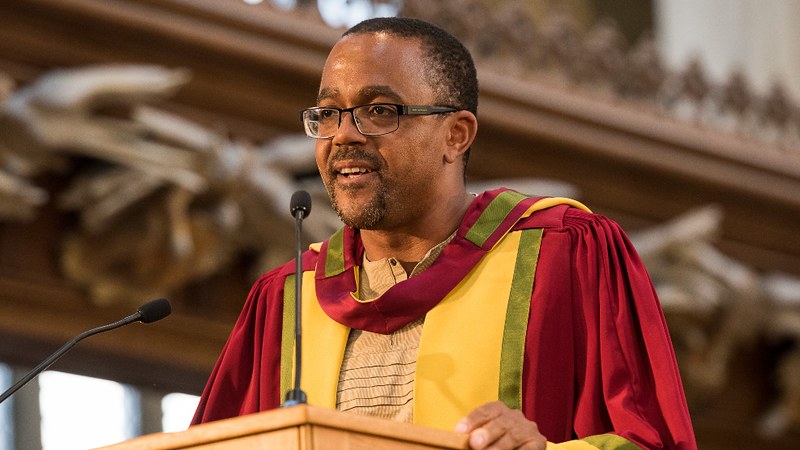Vice-Chancellor, Kehinde Andrews is the UK’s first professor of Black studies, at Birmingham City University, where he led the team that founded the UK’s first Black Studies degree. His research mainly focuses on resisting racism, racism and movements for social change. He has published a number of books. The first was entitled “Black to Black: Retelling Black Radicalism for the 21st Century, Resisting Racism: Race, Inequality and the Black Supplementary School Movement”. His latest, published last year, is called “The New Age of Empire: How Racism and Colonialism Still Rule the World”. He is editor of the “Blackness in Britain” book series and has written articles on both sides of the Atlantic, for the Guardian, Independent, Washington Post and CNN. He regularly appears on television and radio shows. He is director of the Centre for Critical Research at Birmingham City University; founder of the Harambee Organisation of Black Unity and editor-in-chief of “Make it Plain” a website for Black radical thought.
Andrews grew up in Birmingham. The son of two committed Black activists, who established numerous organisations and promoted the Black radical intellectual tradition. In contrast, Andrews didn’t embrace their legacy. In fact, his path to Black studies took a diversion when he rebelled against everything it and his parents stood for. He ignored the values and culture he had been brought up with and started emulating the behaviour and interests of his white friends. He would go to the pub and watch England play, singing patriotic songs. He even began to listen to country music, in his desire to be someone else.
Eventually, he found his way back to the Black radical tradition in which he had been raised. Andrews’ mother is half white English, half Jamaican, a university graduate who was born in Britain. His father was born in Jamaica and came to the UK in his early teens, but left school with limited qualifications. He was a product of a school system that had no interest in the career prospects of Black boys.
His parents were focused on improving education and so it was predictable that he would return to their values through reading. His education in Black studies began when he started picking up the books lying around his home. Travel further broadened his education. A Voluntary Services Overseas youth exchange programme took him to postapartheid South Africa, where he realised, despite legal changes, Black people were still oppressed. When he returned home he was a completely different person. He completed a masters degree in Social Research and earned a PhD. in Sociology and Cultural Studies from the University of Birmingham in 2011. His thesis was entitled “Back to Black: Black Radicalism and the Supplementary School Movement.
The Black studies course at Birmingham City University is an attempt to create the radical Black education that he grew up with and incorporate it into the university. In the second year of this course, his students take a placement, where they apply their knowledge within an organisation that works in Black communities. He believes the course is the resurrection of an existing legacy, not the creation of a new one. Black studies is new in the university, but it’s not new in the United Kingdom.
He has appeared on numerous prime time television shows, where he has debated with Nigel Farage about whether the Flag of St George is racist and whether portraits of the Queen are offensive. He has also been involved in several arguments with Piers Morgan, including one around the legacy of Winston Churchill. Why does he do it? His justification is pragmatic. “The reason I keep doing it is, I would walk down the street and a Black person would come up to me and say: ‘Go on, Prof!’.
Black people, he believes, are relieved to have a representative in these debates – and to be given facts and tools with which to argue their points when these debates come up in their own lives. In other words, he gets to talk about ideas such as “the psychosis of whiteness” for clickbait, but this generates further conversations on social media, and in people’s social and professional circles, that is useful.
Currently, he is focussing his energy on the grassroots, providing “an account of society from a Black radical perspective” – and to include his four children in his work. The first “celebrity” they could name was Malcom X. He takes them to his talks as often as possible and is working with them on a “Choose Your Liberation” children’s book, a choose-your-own-adventure story that explains Black radical politics.
Andrews is a leading social scientist who has shown incredible courage and tenacity in his commitment to challenging racism developing Black studies and in the UK and the world. He is an inspiring example to us all.
Vice-Chancellor, I present to you Professor Kehinde Andrews who is eminently worthy to receive the Degree of Doctor of Education, honoris causa.
